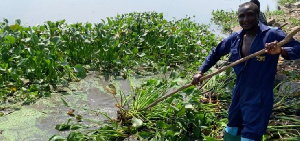Climate Change & Energy
Fishermen Desert Tano Lake Due To Water Hyacinth, Pollution
Source: GNA - December 9, 2021

Water hyacinths take over lake
Fishermen at Jaway Wharf, a border community in the Jomoro Municipality of the Western Region, say invasive aquatic weeds, particularly water hyacinth infestation and pollution from illegal mining, have pushed them out of work.
While the weeds regularly destroyed their fishing gear, the pollution by illegal miners had made the river uninhabitable for fish.
Dr Maxwell Billah, a Senior Lecturer at the Department of Animal Biology and Conservation Science, University of Ghana, explained that water hyacinth grew on river surfaces depriving living organisms from sunlight and oxygen.
He told the Ghana News Agency that the aquatic plant gradually drove away organisms beneath the water and rendered the river unproductive.
Though the plant appears very beautiful and desirable, it has proven to be very problematic for socio-economic development and doubles itself within five to 15 days.
Mr Kwesi Nyameh, a former fisherman, told the GNA during a visit to Jaway Wharf that more than 80 per cent of the fishers had relocated to the Central and Greater Accra regions in search of jobs.
“The river in the past was very clean and the area was known as the source of the best tilapia in the country. Now there is no tilapia in the river again. If you chance upon tilapia in the town then it probably would be coming from Cote d’Ivoire,” he said.
“There are island communities that are part of Ghana. In the past we used to drink from the river but now we cannot drink from it anymore. The only option is to keep sachet water in the canoe,” he said.
Mr Nyameh appealed to the government to equip the youth with skills to engage in alternative livelihood ventures.
Other users of the Lake like the Boat Owners Association said the weeds made it difficult to convey passengers to the five island communities so they were compelled to halt their transport business.
Mr Emmanuel Adeapena, the President of the Association, said; “The weeds lock the canoe, entangle the outboard motor and stop it from working. In the past we used to travel to Elubo by canoe, but now it is not possible, because the weeds have covered the surface of the water.”
“At the peak of the weeds infestation, boat owners stay home for almost a month hoping the weeds will disappear. We have a membership of more than 200, whose livelihoods depend on the boat business. Any time we are out of business our families suffer.”
He appeals to the government to take steps to buy machines to clear the weeds and open up the landing sites.
Mrs Jewel Kudjawu, the Acting Director of Natural Resources at the Environmental Protection Agency (EPA), said water hyacinth was one of the 120 invasive species identified in the country to threaten livelihoods and food security.
Additionally, indigenous water plant; Viossia cuspidate, has also become invasive compounding the problem.
She said studies conducted by the EPA revealed that water hyacinth, a free-floating and flowering invasive aquatic plant, originated from the Amazon Basin, South America and had massively infested the two biggest fresh water bodies in the country: the Lower Volta River and the Tano River and Lagoon complex in Jaway Wharf.
The EPA was working with partners to use integrated methods to control the weeds, she said
Water Hyacinth and other aquatic weeds in the country could be used as bioenergy, compost for agriculture and feed for livestock, Mrs Kudjawu said.
“There is, therefore, the urgent need to make substantial investment to explore these options as a country to turn the problem into benefits.”
 Water hyacinths take over lake
Water hyacinths take over lake


